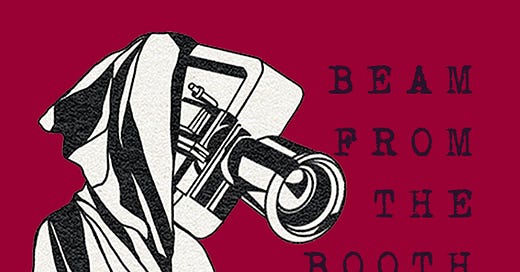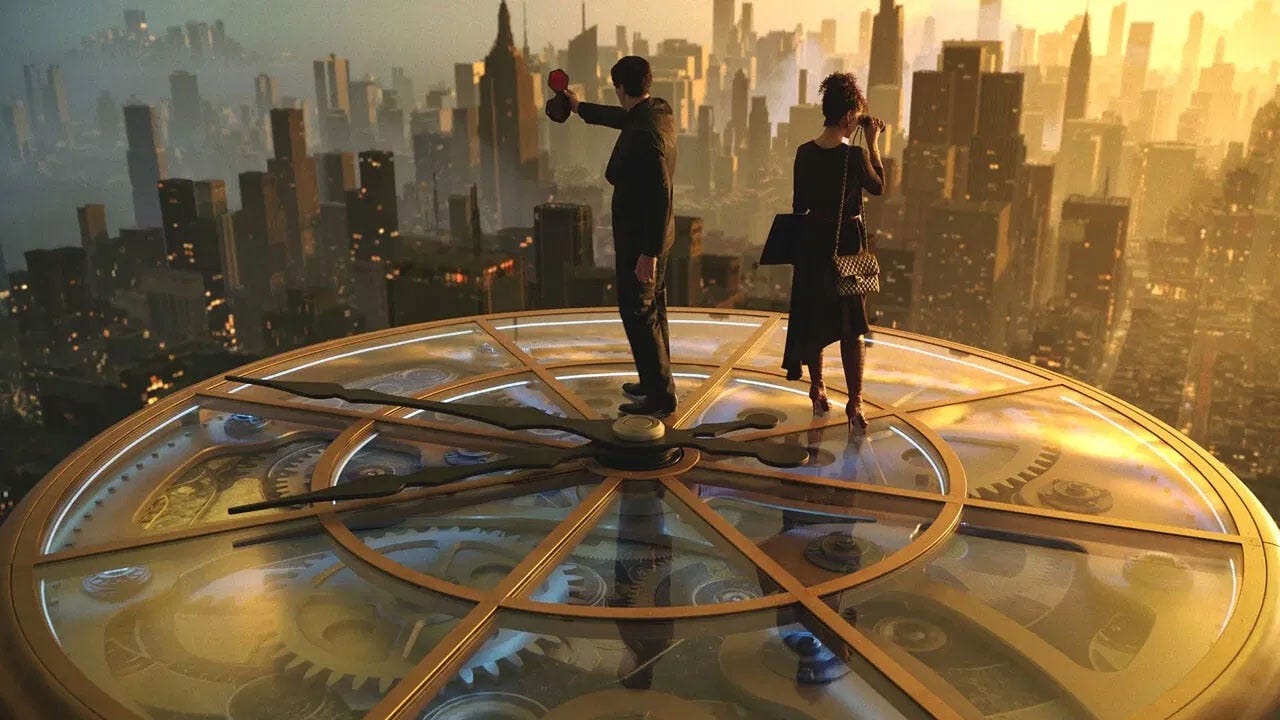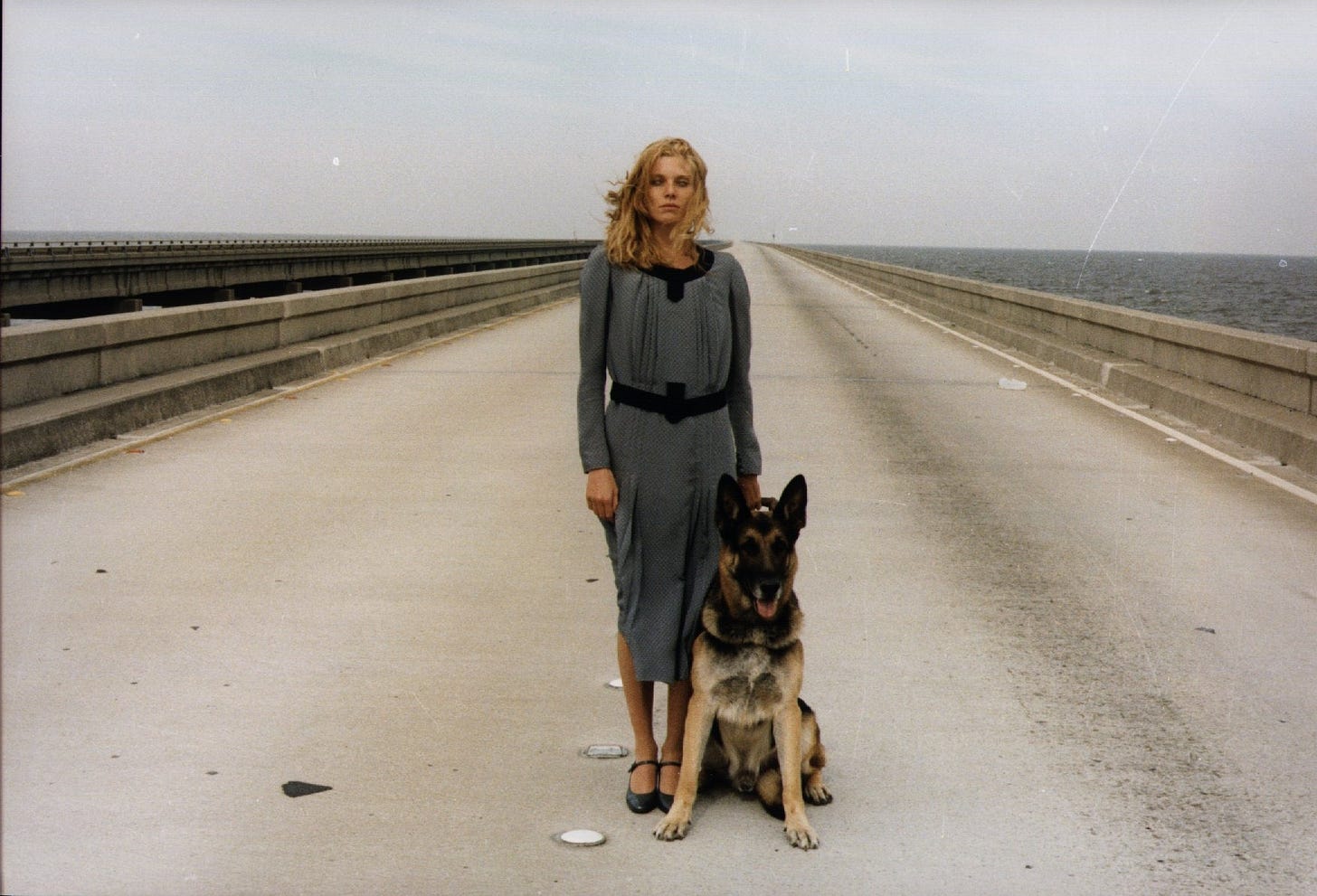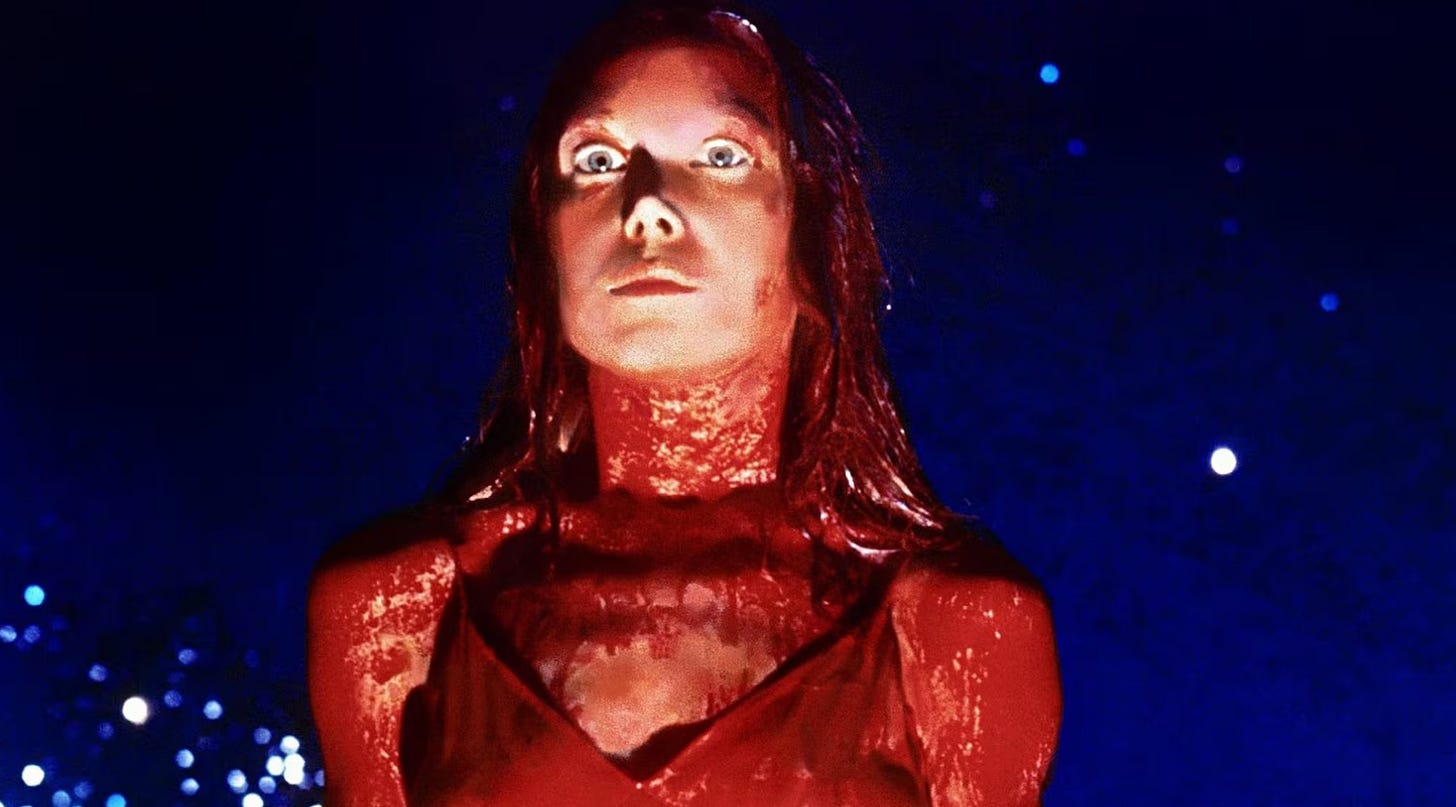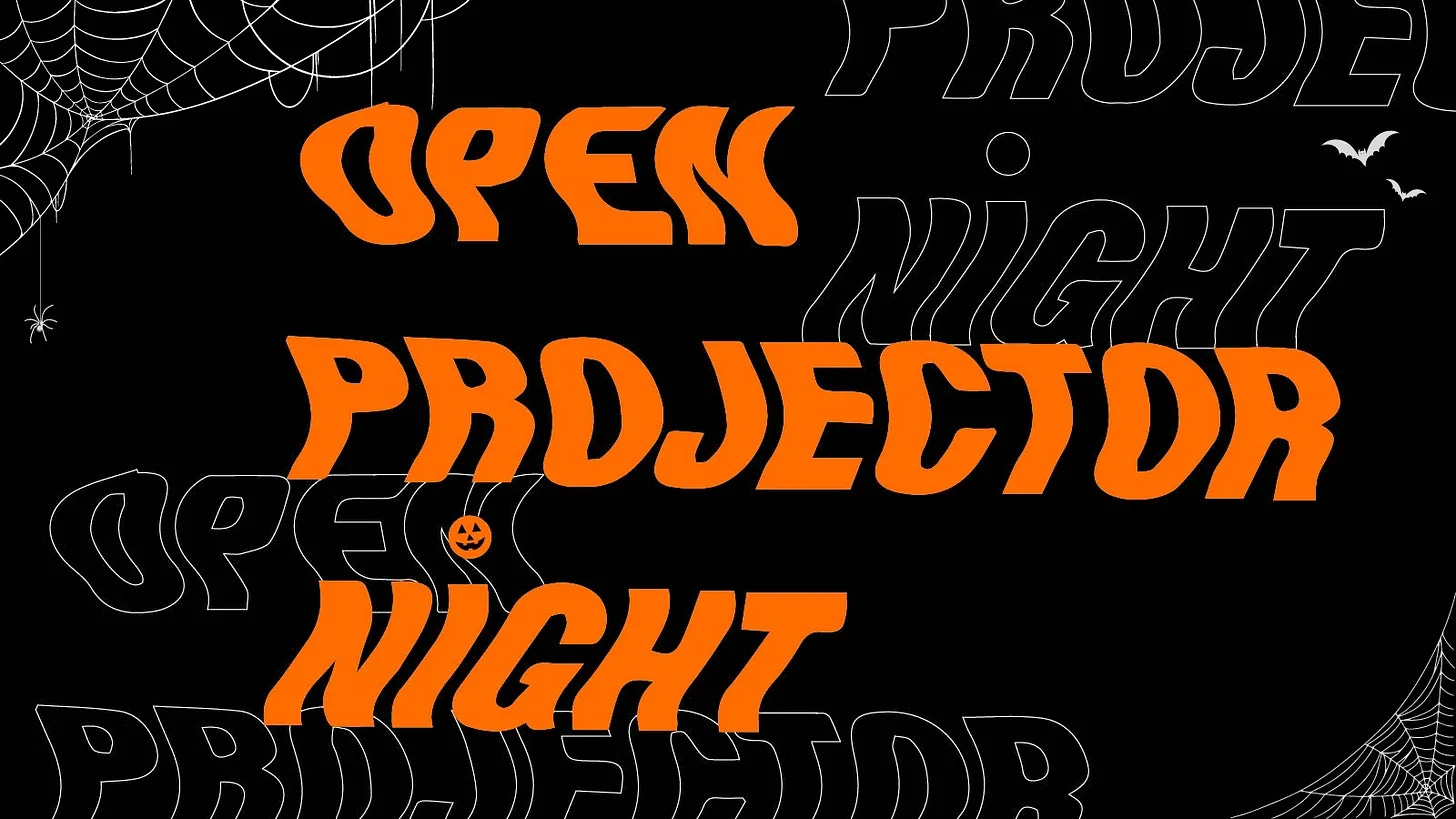[EDITED BY: GRIFFIN SHERIDAN & SPENCER EVERHART]
Hello and welcome back to an all-new installment of BEAM FROM THE BOOTH brought to you by GRAND RAPIDS FILM SOCIETY.
Our October programming begins TONIGHT (10/7) at 8:00pm with the new 4K restoration of Lucio Fulci’s THE BEYOND (1981)!
If you missed it, our very own Nicholas Hartman gave some context for this screening in our last issue. It is surely one that you don’t want to miss!
The fall movie season can often be a desolate time, but there’s no denying that one of the most noteworthy releases of the year is Francis Ford Coppola’s decades-in-the-making passion project Megalopolis. Check out David’s review of Coppola’s latest opus...
A VISIT TO MEGALOPOLIS BY A SURVIVOR CAUGHT IN THE CROSSFIRE
[BY: DAVID BLAKESLEE]
Earlier this week I spontaneously took a half-day off from my job so that I could head over to Celebration North to take in Megalopolis — the much-discussed, ultra-divisive, and presumed career capstone of Francis Ford Coppola, one of the most consequential American directors of the past half-century. As someone who was too young to see The Godfather (1972) during its initial dominant theatrical run but was still very aware of its massive commercial success and cultural influence (and as an opening weekend viewer of Apocalypse Now when it finally overcame all the obstacles and made its hotly-anticipated theatrical run), seeing Megalopolis — functioning as Coppola’s latest and probably last ambitious landmark production — in its optimal presentation felt more compulsory and mandatory to me than just about any other new release film ever could.
I say all that even though I was also highly aware of a tidal wave of negative reviews that in some quarters swelled to a crescendo of scathing denunciations, even crystallized hatred, not only for the movie itself but also for some of the key individuals who were central to its creation. In recent scrolls through various social media platforms, I encountered a number of posts and short videos that were so vehement in their critiques and strident in their insistence that people should avoid watching it because it was so undeserving of public attention that it felt to me like I ought to feel ashamed and remorseful for simply putting actual money down to support Coppola’s unworthy cause.
Of course those arguments proved unpersuasive to me, but they did stir my curiosity to better understand just what grievous offenses occurred (whether on-screen or off) to earn such unyielding opposition. Films that don’t congeal into logical or coherent narratives are fairly common, and I couldn’t imagine that there would be any images or incidents within the story so extreme that they crossed moral or ethical redlines adhered to by Megalopolis’ detractors. Simply dismissing a movie as lousy, indulgent, frivolous, irrelevant, and out of touch with contemporary attitudes is also not that hard to do without also including the elements of personal invective that seemed to underscore a lot of the thumbs-down takes I ran into.
It’s been evident since the film’s wide opening that Megalopolis was on its way to securing an infamous and enduring reputation as a colossal box-office flop, one of the biggest of this century, which is why Celebration was pulling it out of the IMAX theater so soon into what will likely be a very brief theatrical run overall. I suppose that will be regarded by the anti-Megalopolis camp as a victory of sorts, maybe even as the fulfillment of a mission. The positive counter-reviews, those that celebrated Coppola’s big swings and innovative visual compositions; that found admirable commitments or suitably diverting entertainment in several of the acting performances; and that applaud the existence of a creatively ambitious big-budget indie magnum opus on its own terms, also registered on my radar and provided at least a seed of confident hope that my ticket fee and the hours committed would not prove to be a total waste.
It was with all that in mind that I entered the theater, and the paragraphs below are what I wrote soon afterward:
Just got home from the last local IMAX screening of Megalopolis that's ever likely to occur in my area, unless perhaps it returns as a cult classic some years from now, which I don't expect will happen. (To be fair, I have seen The Godfather and Apocalypse Now in IMAX screenings decades after those films premiered, but I'm not sure I'll live long enough to see Megalopolis enshrined in the cinematic canon as those two titles, most deservedly, have been.)
I went in very intrigued by the extremely polarized responses that I've seen online and from a few friends who've seen it, and I emerge wondering just what it was that provoked such intense reactions after all was said and done. Honestly, responses that proclaim it to be either the bold forerunner to the future of cinema or a steaming pile of overbaked wankery seem like cheap or convenient efforts to bolster one's critical or curmudgeonly reputation to audiences inclined to stake their claims on either side of the divide. For now, I'm thinking it's a 3 1/2 star effort, with room to move up to 4 upon rewatch or maybe an extended director's cut.
To me, it felt like a somewhat bloated but creatively ambitious and original work of cinematic art, with a fascinating cast, some incredibly gorgeous visual elements, and lots of big ideas that provide diverting food for thought and a lot to talk about afterwards if we want to engage in analysis and application of FFC's speculative notions and the profound questions he asks in a clunky and ham-handed way. In short, I got plenty of what I came for, would definitely be interested in watching it again to see if the dots connect any easier or more naturally now that I have a better idea of where the narrative is headed. There are plenty of valid criticisms one could level at the disjointed narrative, the stiff dialog (though the film's self-proclaimed status as a "fable" does alleviate some of the obligation to make characters speak and behave like regular people), gratuitous grotesquerie, cheap thrills and provocations, and a general impression of things just not quite adding up. However, all those shortcomings are balanced out (in my estimation, anyway) by the impressive tableaux and willingness to play around with contemporary archetypes of the major powers at work in contemporary culture: finance, technology, politics, celebrity, big business, professional rabble rousers, and the too-often stifled voices of utopian dreamers who still dare to envision a future where the human condition shows signs of actual improvement rather than inevitable decay into misery, pain, and trauma, which seems to be the prevailing narrative in many circles.
For many younger viewers (let's say under 35 or so), I definitely understand that there may be some weariness or even disgust at having to endure the grandiosity of older generations and FFC's vision in particular. So if his pomposity or self-importance is itself the big issue here, then there's no surprise to see that he's being rejected even though he tries to end the story on a note of uplift for the future. To be fair though, he's centering his hope on a baby, not on the role that millennial or Gen Z members of his audience will have in steering human destiny - so resentment on that account also makes some sense. But I have a suspicion that it's the involvement of Coppola himself, along with the detestable (in real life) Jon Voight that is driving a lot of that hostility.
I have no interest in trying to change anyone's mind on the merits of Megalopolis, and there may even be serious validity to the film's resulting failure as a revenue generator, at least in the short term. But while I don't agree with some of the reviews I've read that want to elevate this to the level of a postmodern masterpiece, I do think that it will have more staying power and may prove to be somewhat influential to a subset of future film directors who will find tools and techniques to build with while dispensing with much of the indulgence that Coppola felt was deserved and legitimate as a capstone to a career that has more or less been fixated on realizing his creative vision without having to concede all that much to the whims of the studios or popular tastes. Coppola had a lot of success molding audiences to see things his way back in his prime, and it seems like he's continued on that path even when the commercial returns weren't nearly as obvious over the subsequent decades. Now that he's at a point where he wants to cash in his chips and make a big statement, it should come as no surprise to anyone who's engaged with his work that a film with all the undeniable flaws and admirable virtues of Megalopolis is the result.
So there’s my contribution to the discourse about Megalopolis — though I know I have more I could say if further thoughts on the topic are of any interest. I’d actually like to hear more from those who disliked the film or have a substantial take on it from pretty much any angle. Let’s hash it out on Discord...or come find me in the lobby at Wealthy Theatre sometime soon, and we’ll continue the conversation!
ALL HAIL LETTERBOXD!
[BY: ANNA DAVIS, SPECIAL GUEST CONTRUBUTOR]
Ah, Letterboxd. Shall I compare thee to a summer’s day? I love updating my Four Favorites, browsing my Watchlist then choosing to watch something I’ve seen before instead, and writing a super-detailed review that only gets two likes. It’s just the best, isn’t it?
Letterboxd exploded in popularity in 2020 and is now a cornerstone of the online cinephile community. The app saw rapid growth during the COVID-19 pandemic, rocketing from 1.7 million users in January 2020 to over 14 million users today. Letterboxd just reported the milestone of 2 billion movies marked as ‘watched,’ only a year after hitting 1 billion watched. In late September, director John Carpenter asked “what the hell is a Letterboxd??” So clearly, word is getting around.
Reviews are the platform's centerpiece, and I’m sure we can agree that it’s a delight to read the funny, in-depth, and sometimes enraging things people have to say in their write-ups. I will fully confess to pondering what quippy review I could post about a movie long before the runtime is complete — guilty as charged.
What we Letterboxd users are also guilty of is something perhaps more impactful to the film community: we’re taking away power from the professional critic. Thanks to online communities on YouTube, MovieTok, and Letterboxd, the traditional film critic no longer holds the power they once had to send the public to the movie theater. Review aggregators like Rotten Tomatoes are a first stop for audiences looking to figure out if they want to see a movie rather than turning to professional opinions in newspapers and online publications. This power has transferred hands to a new generation of everyday moviegoers who are driving film discourse. But is this a bad thing? Let’s discuss.
EVERYBODY’S A CRITIC
The movie critic emerged as a profession in the 1920s, so even before ‘talkies,’ people were talking about movies. In the ‘80s, Siskel & Ebert’s reviews were notable enough to get a weekly PBS show. Now, once-household names like Pauline Kael or Leonard Maltin are nearly entirely unknown to Gen Z who turn to IMDb or Letterboxd to judge the quality of a film (unless you have a book of all of Pauline Kael’s reviews which, if that is the case, welcome to the club).
Some critics have decided to ride the Letterboxd wave. David Sims of The Atlantic often shares portions of his extended film reviews with his 65,000+ followers on the app. On the flipside, longtime New York Times film critic A.O. Scott retired from his position in 2023, citing the bleak future of filmmaking as part of the reason for his departure:
“Am I worried? Of course I’m worried. The cultural space in which the movies I care most about have flourished seems to be shrinking. The audience necessary to sustain original and ambitious work is narcotized by algorithms or distracted by doomscrolling. The state of the movies is very bad.”
I don’t disagree with Mr. Scott. The mid-budget movie is disappearing, RDJ is playing Dr. Doom, and production companies are posting entire movies in 3-minute increments on TikTok. Things are weird. But in times like these, isn’t it critical for movie lovers to scream our woes from the rooftops, not retreat in fear? As some critics abandon ship, they are being replaced with a new brand of cinephile: the Letterboxd user.
Letterboxd reviews have given a new, dedicated space for the ‘everyman’ to share their thoughts about film. People who care about movies are on Letterboxd, reading the thoughts of other people who love movies too. Letterboxd user Tyler Their, writing in the journal Senses of Cinema, shares his feelings around having a space like Letterboxd, particularly when watching a film that provokes strong emotion:
“I only wish I had had a Letterboxd account when I had seen those films. Maybe then, instead of ruminating on it long after the fact, I could have logged in and chronicled my feelings in a more direct sense... finding room for that communal I of the average moviegoer, the spectator who is neither a scholar nor an industry insider, who might be obsessed with watching movies or only casually watch them — nevertheless, they have something to add to the discourse that too often gets overlooked.”
In the streaming age, a 15-year-old in the Midwest with a Hulu account can just as easily watch last year’s Palme D’or winner as a billionaire on his yacht in Saint-Tropez. Both can hop on their Letterboxd account and share their thoughts. But the question is: does that make both their opinions equally relevant film commentary? A billionaire and a 15-year-old Midwesterner presumably have very different audiences and spheres of influence on Letterboxd. But I would argue we’ve entered a period where a teenager with the right combination of moxie, timing, and luck can get just as much of an online platform as an old rich guy.
Of course, those more educated in an artform are largely better at articulating what makes a piece of art “good” or “bad.” In his twenty years of film criticism, A.O. Scott gained a breadth and depth of cinematic knowledge that allowed him to contextualize films and determine what he felt was original or ambitious work. The average 15-year-old does not contain those multitudes. However, Letterboxd makes space for both sides of that coin — democratizing film discourse by providing a level playing field for all voices to be heard.
Having a dedicated online space for film lovers of all shapes and sizes to share their thoughts is an inevitable development in our digital age. Reading Ayo Edibiri’s review of Salo just seems so normal...no different than anything you’d read from a friend. To me, it’s the crux of what makes Letterboxd so wonderful. We’re all just having fun and loving movies.
WHAT’S NEXT FOR OUR LETTERBOXD OVERLORDS?
Letterboxd hasn’t changed much in the 7+ years I’ve been a user. But don’t forget! Capitalism is king, so things can and will change with our beloved little app to keep bringing in profits. In the fall of 2023, the majority stake of Letterboxd was sold to Canadian firm Tiny for over $50 million, and shortly after, a significant update was added allowing users to browse local theater showtimes for any movie on the platform. Even bigger changes are on the horizon with the announcement of adding a full catalog of television shows to the platform for users to rate and review.
Letterboxd is also creating a physical presence in the movie theater, partnering with predominately independent studios and distributors to host screenings of new films for the app’s users. Leveraging user data, they can cultivate audiences who are more likely to enjoy these screenings. If you tend to give all of Greta Gerwig’s movies stellar Letterboxd reviews, then you might find yourself with an exclusive invite to an early screening of her next film — and, of course, you’ll give it five stars because you love Greta...and you love to see movies early.
Remember what A.O. Scott said about audiences being narcotized by algorithms? These tactics remind us that Letterboxd isn’t just a community, it’s a business. In social media, there is profit in ad revenue, but the real currency is people. The data you provide about your interests, preferences, and viewing habits is a goldmine. At present, these methods aren’t detracting from the democratic nature of the platform. But it’s a slippery slope, and I deeply hope the drive for profits does not suck the joy out of simply talking about film.
Watching movies has gone mobile, and Letterboxd has enabled the movie community to go mobile too. Is it a good thing that people can watch 2001: A Space Odyssey on their iPhones? Not particularly. But in our digital age, it’s a certainty that films will be viewed on screens of all shapes and sizes. We’re watching movies on the go, and at least Letterboxd provides a dedicated space to cultivate community around film online. As someone who grew up in a small town and always struggled to find people as obsessed with movies as me, I’m grateful for any space that allows me to find other movie nerds...and Letterboxd has helped me do that.
Letterboxd has reported that over half of its user base is under the age of 35, a signal of a new generation of film fans who are truly interested in the art of filmmaking. With 14 million users, Letterboxd has a relatively small footprint compared to Facebook, X, or even BeReal. It’s a microcosm of internet culture centered around the appreciation and enjoyment of art — for now, at least. And I, for one, bow down to the Letterboxd overlords. All hail!
It's always a pleasure following local movie lovers on Letterboxd. Be sure to follow GRFilmSociety and WealthyTheatre. If you’re so inclined, you can also follow me at Anna_Davis.
UPCOMING EVENTS
THE BEYOND (Fulci, 1981)
WHAT: A young woman inherits an old hotel in Louisiana where, following a series of supernatural "accidents", she learns that the building was built over one of the entrances to Hell.
WHEN: TONIGHT! Monday, October 7th, 8:00pm
WHERE: Wealthy Theatre
CARRIE (De Palma, 1976)
WHAT: A PROM THEMED PARTY! Come dressed in your best prom attire and celebrate the new 4k restoration of Brian De Palma's iconic Stephen King adaptation.
WHEN: Friday, October 11th, 8:00pm
WHERE: Wealthy Theatre
OPEN PROJECTOR NIGHT: HALLOWEEN EDITION
WHAT: Highlighting short films specifically of the horror/spooky genre from independent filmmakers with a Michigan connection!
WHEN: Wednesday, October 16th, 7:00pm
WHERE: The Wealthy Theatre
And so we’ve arrived at the end of another BEAM FROM THE BOOTH! We appreciate you taking the time to read it and truly hope you’ll continue to do so. Be sure to SUBSCRIBE to get each issue in your inbox every week, and stay up-to-date on all things GRFS.
Plus, join us on social media! We’d love to chat with everyone and hear YOUR OWN thoughts on everything above (you can also hop in the comments section below).
Know someone you think will dig BEAM FROM THE BOOTH? Send them our way!
Look for ISSUE #73 in your inbox NEXT WEEK!
Until then, friends...

